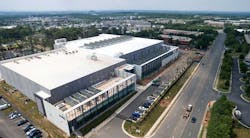Co-Founder Dave Ferdman Returns to Lead CyrusOne, as Duncan Departs
CyrusOne co-founder David Ferdman will reassume leadership of the company, taking the posts of interim President and Chief Executive Officer, effective immediately. Ferdman succeeds Bruce Duncan, who is departing the CEO and President posts, as well as a board seat, just a year after he was appointed.
The company offered no details in announcing Duncan’s departure, saying that the board was “separating with” Duncan.
“I look forward to working with our team as we execute on our plan and create shareholder value, while working with the Board to evaluate potential successors,” said Ferdman, who called CyrusOne “a world-class organization with a track record of delivering flexible, reliable, and scalable data center solutions for our customers.”
Ferdman becomes the fourth CEO for CyrusOne in the past 18 months. But Ferdman has been with the company from its inception, and his return is likely to convey stability and continuity to the company’s customers and the industry.
“Dave co-founded CyrusOne, was our CEO until 2010, and has remained continuously engaged with the Company in various roles, including serving on the Board of Directors since 2013,” said Lynn Wentworth, Chairman of the Board for CyrusOne. “As our Interim President & Chief Executive Officer, Dave brings to the team decades of industry experience, dynamic leadership, and a deep understanding of our business. We are confident Dave will lead our company forward towards achieving its plan and objectives during this transition period.”
Duncan was named CEO in June 2020, and was an unusual choice, as he had no direct experience in the data center industry. Duncan is a veteran real estate executive who had led several public real estate investment trusts (REITs) specializing in distribution centers and logistics real estate.
The leadership transitions at CyrusOne began in February 2020, when long-time CEO Gary Wojtaszek departed abruptly, and the board turned to industry veteran Tesh Durvasula as interm President and CEO. Four months later, the board named Duncan the new President and CEO, and Durvasula left the company.
Lengthy Leadership Experience at CyrusOne
CyrusOne was founded by Ferdman in 2000, and found its niche specializing in high-density colocation services for energy companies in Houston and Dallas. The company, which was named for a Persian ruler featured in the Old Testament, expanded across Texas after it was acquired in 2007 by private equity firm ABRY Partners. In 2010, Cincinnati Bell paid $525 million to buy CyrusOne, which was then spun off in an IPO in January 2013.
Ferdman stepped aside as CEO after the sale to Cincinnati Bell, which brought Wojtaszek on as CEO. As a public company, CyrusOne’s focus on rapid deployment helped it reach the very top levels of the data center business. The company rode a trend in which the world’s largest hyperscale Internet companies have begun leasing cloud capacity from data center developers, rather than building their own server farms.
Duncan took the helm in the midst of the COVID-19 pandemic, at a point where CyrusOne was struggling to land hyperscale deals during a period of record leasing for wholesale data center space. Duncan noted the need for a turnaround in CyrusOne’s earnings call for the third quarter, after the company leased just 4 megawatts (MWs) of capacity.
“We have lost share over the last couple of years, and we need to improve in this area,” said Duncan. “We think that by being a little bit more aggressive that will help business. I was disappointed in our hyperscale leasing in the third quarter. I don’t plan to be disappointed in the fourth quarter.”
CyrusOne bounced back with 31 MWs of leasing in the fourth quarter, followed by 28 MWs in the first quarter of 2021, and 21 MWs in the second quarter.
About the Author



